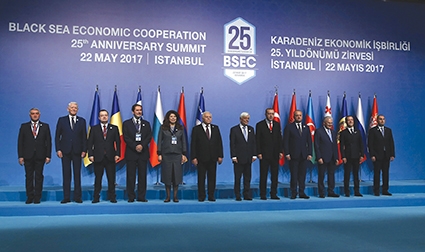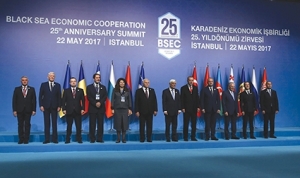BSEC Summit – B Is for Blame Games
Now, first things first: Despite the headlines that some of the Georgian media gleefully rolled forth last week, it wasn’t Vice PM Kumsishvili’s idea to get up and stand beside the Russian PM Medvedev in a group, or as they prefer us to call it, a family photo. If anything, he was late to attend and rather stone-faced. Nor so did an earlier meeting between the two take place, as much as the abovementioned Georgian media would like us to believe. How do I know that? Well, officially Medvedev had two meetings – one with the Turkish side and another with Moldovan President Igor Dodon. Could an unofficial meeting take place? Let’s indulge the thought, but it’s hardly believable – Both arrived late to Istanbul and Medvedev’s press aides spent the whole day with us except for those two meetings. In conclusion – we may pride ourselves in having the best ‘freedom of the press’ levels in the region, but when it comes to truthful reporting, we still have a long way to go.
With that little scandal dealt with, let’s go on to what actually happened at BSEC (Organization of the Black Sea Economic Cooperation) 25 Anniversary summit, which, courtesy of the Turkish embassy in Georgia, I was able to attend. First, here is some trivia for you: It first came into existence in 1992, became what it is today in 1999, has 12 members (all Black Sea countries plus Albania, Serbia, Greece, Moldova, Armenia and Azerbaijan) and is essentially the biggest regional platform for Economic cooperation. Economy is the key word here: with all political and in some cases, military turmoil, that has been plaguing the region for decades now.
Right, sure. As you well know, it is virtually impossible to separate politics and economics these days, and such an approach results in increasingly limited room to maneuver into and even more of a limited scope for cooperation. Remember Krylov’s “The Swan, The Pike and The Crab”? – Well, this is exactly what took place at the 25 Anniversary summit, with the notable distinction that there were sides that seemed to be unwilling to move at all.
They say a summit is only as good as its declaration – actually, no, I just made it up; but thing is it was the concluding declaration of the summit that proved to be the Gordian knot for the participants. On one hand, it was Georgia and the Ukraine who were vocal against Russia; on another- Armenia and Azerbaijan, traditionally unwilling to bury the proverbial hatchet. The Georgia Ukraine alliance wanted to put in a paragraph denouncing Russia’s aggressive actions in the region, while the Azerbaijan v.s. Armenia standoff ascended to the heights of Monty Pythonian absurdity, with Azerbaijani deputy Minister of Foreign Affairs, Mahmud Mamedgulyev dutifully informing us (direct quote): “it’s them Armenians again, as always, they are keen to undermine everything we want to work together on in the region.” Which, as his Armenian counterpart, Ashot Ovakimian thought, (direct quote) was “ nonsense, as usual from Azerbaijanis”. One thing they seemed both in agreement on though was the importance of retaining cooperation with the European Union. While discussing ongoing talks over visa facilitation procedures, both underlined that this was something the people of both nations wanted and were looking forward to. As for the Ukraine, which will already enjoy visa free travel as of June 11, it was an occasion to remind the leaders of the region that War in Eastern Ukraine is far from over and indeed to point a finger over to the main culprit – Russia. Indeed, Kiev’s top diplomat, FM Pavlo Klimkin, was one of the more forthcoming and outspoken journalists at an otherwise very much media restricted, behind closed doors kind of event. His rather blunt borderline sarcastic commentary is perhaps best analyzed for understating and highlighting the challenges that the BSEC organization is currently facing:
“When you ask me whether I expect significant decisions to be made at this summit, I’ll have to say that no, regrettably I don’t have such expectations. Why? Because we have a catastrophic situation when it comes to security in the Black Sea region. All thanks to Russia, which is behind most conflicts and instability in the region. We need to sort out these security issues somehow. I told my colleagues today that the BSEC organization is in deep crisis and we need to try and find a way to move forward. Our principal position regarding the declaration is that international values and international rights should be safeguarded and adhered to. That’s something we will not and cannot compromise on. Quite understandably, we do not view Russia as a feasible partner in economics, or in any sense a trustworthy partner, truth be told. And without trust, you cannot build cooperation, economic or otherwise. “
In the end, it fell to into the responsibility of the hosts – the Turkish side -to mediate a declaration, which they successfully did – Despite the statements that the returning Georgian delegation gave to the media, notions akin of “Aggression by Russia” and “breach of international law” did not make it into the final draft (look out for that and many more during the upcoming Ukrainian chairmanship), which underlined the importance of BSEC itself as the highest level discussion and consensus finding body over economic cooperation issues in the region. It calls on all sides to respect international law, maintain safety of navigation in the Black Sea region (Russia signed this? The gall!), commends the contribution of all involved sides, mentions the importance of the cooperation with the EU, issues like shipping, innovation, young entrepreneurs’ – pretty much every subject that all concerned couldn’t start a fight over. Some might call it a generic document, yet there will be others who will hail it as a compromise found amid adversity and a future reference point. 25 years of consensus, maintaining the ever shifting scale of balance – a feat not to be dismissed. A feat BSEC seemed able to pull off thus far, but the question is – for how long?
By Vazha Tavberidze












